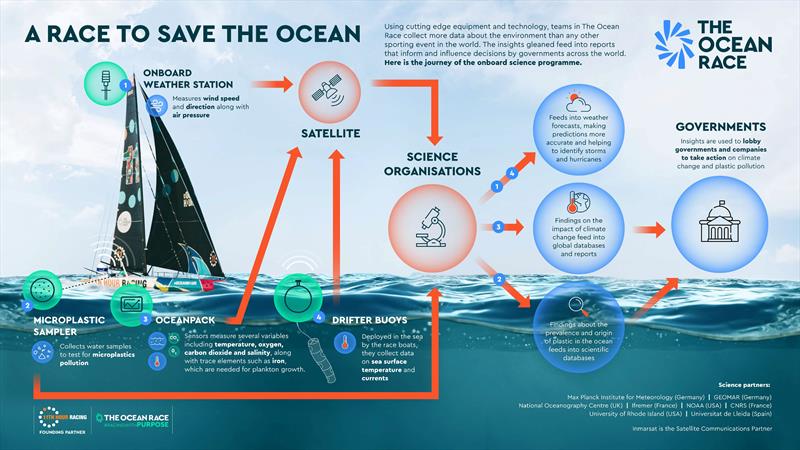
The Ocean Race to collect more data about the environment than any sporting event in the world
by The Ocean Race 6 Jan 2023 00:50 AEDT
15 January 2023

The journey of the data captured in The Ocean Race science programme © The Ocean Race
The round-the-world sailing race will measure microplastic pollution, gather information about the impact of climate change on the ocean and collect data to improve global weather forecasting.
The forthcoming edition of The Ocean Race, which sets sail from Alicante, Spain, on the 15th January, is set to feature the most ambitious and comprehensive science programme created by a sporting event.
Every boat participating in the gruelling six-month around-the-world race will carry specialist equipment onboard to measure a range of variables throughout the 60,000km route, which will be analysed by scientists from eight leading research organisations to further understanding about the state of the ocean. Sailing through some of the most remote parts of the planet, seldom reached by scientific vessels, teams will have a unique opportunity to collect vital data where information is lacking on two of the biggest threats to the health of the seas: the impact of climate change and plastic pollution.
Launched during the 2017-18 edition of the Race in collaboration with 11th Hour Racing, Premier Partner of The Ocean Race and Founding Partner of the Racing with Purpose sustainability programme, the innovative science programme will capture even more types of data in the forthcoming Race, including for the first time levels of oxygen and trace elements in the water. Data will also be delivered to science partners faster in this edition, transmitted via satellite and reaching the organisations, which includes World Meteorological Organisation, National Oceanography Centre, Max Planck Society, Centre National de la Recherche Scientifique and National Oceanic and Atmospheric Administration, in real time.
Stefan Raimund, Science Lead at The Ocean Race, said: "A healthy ocean isn't just vital to the sport we love, it regulates the climate, provides food for billions of people and supplies half the planet's oxygen. Its decline impacts the entire world. To halt it, we need to supply governments and organisations with scientific evidence and demand they act on it.
"We are in a unique position to contribute to this; data collected during our previous races has been included in crucial reports about the state of the planet that have informed and influenced decisions by governments. Knowing that we can make a difference in this way has inspired us to expand our science programme even further and collaborate with more of the world's leading science organisations to support their vital research."
In total, 15 types of environmental data will be collected during The Ocean Race 2022-23, including:
- Indicators of climate change: Two boats, 11th Hour Racing Team and Team Malizia, will carry OceanPacks, which take water samples to measure levels of carbon dioxide, oxygen, salinity and temperature, providing insights about the impact of climate change on the ocean. Trace elements, including iron, zinc, copper and manganese, will also be captured for the first time. These elements are vital for the growth of plankton, an essential organism as it is the first part of the food chain and the ocean's biggest producers of oxygen.
- Plastic pollution: GUYOT environnement - Team Europe and Holcim - PRB will take regular water samples throughout the race to test for microplastics. As with the previous edition of the Race, the amount of microplastics will be measured throughout the route and, for the first time, samples will also be analysed to determine which plastic product the fragments originated from (for example, a bottle or carrier bag).
- Meteorological data: The entire fleet will use onboard weather sensors to measure wind speed, wind direction and air temperature. Some teams will also deploy drifter buoys in the Southern Ocean to capture these measurements on an ongoing basis, along with location data, which helps to grow understanding about how currents and the climate are changing. Meteorological data will help to improve weather forecasts and are particularly valuable for predicting extreme weather events, as well as revealing insights on longer-term climate trends.
- Ocean Biodiversity: Biotherm is collaborating with the Tara Ocean Foundation to trial an experimental research project to study ocean biodiversity during the Race. An onboard automated microscope will record images of marine phytoplankton on the ocean surface, which will be analysed to provide insights on phytoplankton diversity in the ocean, along with biodiversity, food webs and the carbon cycle.
All of the collected data is open-source and shared with The Ocean Race's science partners - organisations across the world that are examining the impact of human activity on the ocean - feeding into reports, including those from the Intergovernmental Panel on Climate Change (IPCC) and databases such as the Surface Ocean Carbon Dioxide Atlas, which provides data for the Global Carbon Budget, a yearly assessment of carbon dioxide that informs targets and predictions for carbon reduction.
Véronique Garçon, Senior Scientist at CNRS (Centre National de la Recherche Scientifique) said: "The Ocean Race's Science programme is vital for the science community and their work to support the UN Decade of Ocean Science. The data gathered by the boats from remote parts of the world, where information is scarce, is particularly valuable. Put simply, the more data we have, the more accurately we can understand the ocean's capacity to cope with climate change and predict what will happen to the climate in future."
The Ocean Race's science programme, which is supported by 11th Hour Racing, Time to Act Partner Ulysse Nardin and Official Plastic-Free Ocean Partner Archwey, is being ramped up at a time when the impact of human activity on the ocean is becoming more widely understood. Recent studies have highlighted how higher temperatures in the ocean are fuelling extreme weather events and sea levels are projected to rise at a faster rate than anticipated, while whales have been found to ingest millions of microplastics every day.